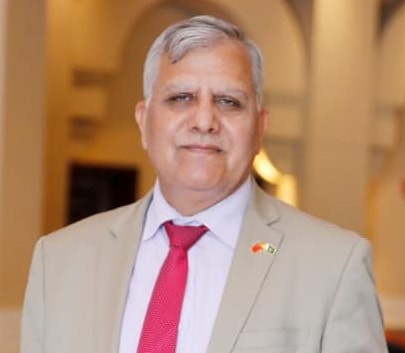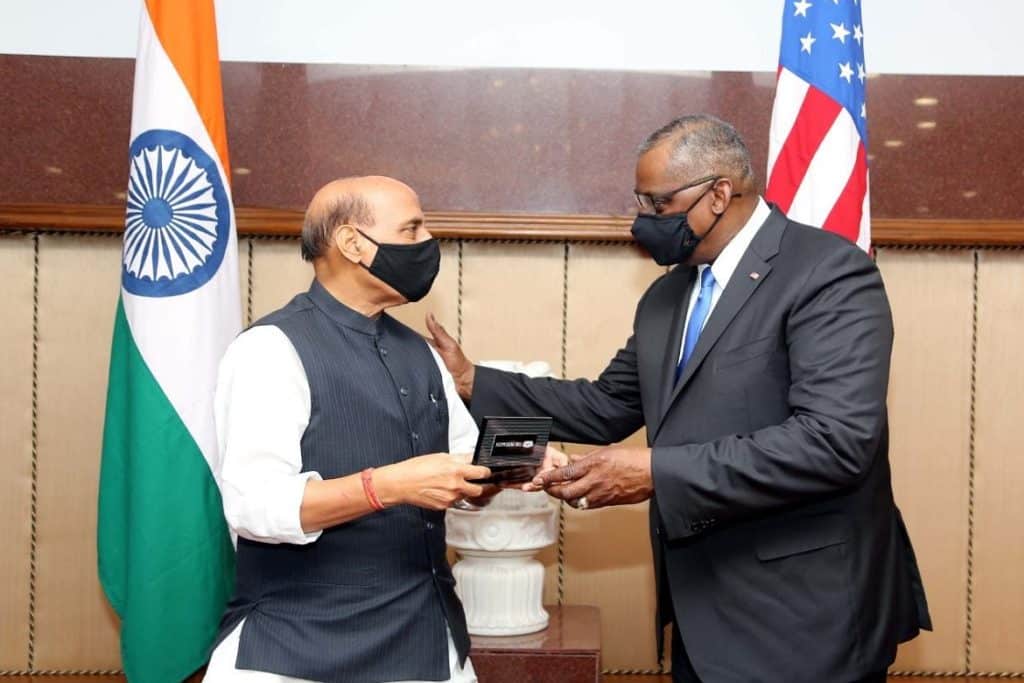By Prof. Engr. Zamir Ahmed Awan
U.S. Secretary of Defense General Lloyd Austin has visited India on 19-21 March 2021 during his maiden trip to Asia’s allies. He reached New Delhi after visiting Japan and South Korea. He held meetings with his counterpart India defense Minister Rajnath Singh and senior military and civilian officials.

Although the two sides discussed broad-based matters, however, the core issue was to get closer cooperation to Contain China, Counter China, and Resist the peaceful rise of China. India is an ally in Quad, along with Australia, Japan, and the United States. However, India’s interests are to get the latest technologies and advanced weapons. India is seeking more cooperation in the Defense Industry and self-sufficiency. At the same time, Americans wanted to sell more weapons.
Indo-U.S. defense trade has grown manifold in recent years, with the U.S. becoming one of India’s top defense suppliers. Media reports suggest a deal for 30 armed drones, ten each for the Army, air force, and Navy pegged at over $3 billion, is close to being approved by the Indian defense ministry. In November 2020, the Indian Navy acquired two Sea Guardian unarmed drones from the U.S. on a one-year lease. India has plans also to buy six additional P-8I long-range maritime patrol aircraft in addition to the 12 already contracted.
In 2016, the United States designated India as a “Major Defense Partner,” and they have since signed a string of deals easing the transfer of advanced weaponry and deepening military cooperation. U.S. defense firms have inked billions of dollars in contracts to supply military hardware, including helicopters, under India’s $250-billion modernization of its armed forces. But Russia remains India’s biggest armaments supplier, and Modi agreed in 2018 with President Vladimir Putin a $5.4-billion deal buy Moscow’s S-400 missile defense system. The agreement falls foul of a U.S. embargo on sales of Russian arms, and India has been negotiating for years to avert sanctions, as happened with Nato ally Turkey when it ordered the S-400.
Lloyd James Austin was sworn in as the 28th Secretary of Defense on January 22, 2021. He is the principal assistant to the President in all matters relating to the Department of Defense and serves on the National Security Council. He has served 41- years in the Army included command at the corps, division, battalion, and brigade levels. Mr. Austin was awarded the Silver Star for his leadership of the Army’s 3rd Infantry Division during Iraq’s invasion in 2003. Seven years later, he would assume the duties of Commanding General of United States Forces – Iraq, overseeing all combat operations in the country. After a tour as the Army’s Vice Chief of Staff, Mr. Austin concluded his uniformed service as the Commander of U.S. Central Command, responsible for all military operations in the Middle East and Afghanistan. In this assignment, he led U.S. and coalition efforts to battle ISIS in Iraq and Syria. He retired from the Army in April 2016.
He is well aware of the region and visited India at a critical moment when geopolitics are changing rapidly. His visit is termed very significant and may have a long-lasting impact on the region.
US-Indian relations have been getting closer under PM Modi and U.S. President Donald Trump, which were based on their personal friendship. India gained a lot from this friendship. However, under President Joe Biden’s administration, personal relations may not play any significant role.
General Austin may also raise the question of human rights in India, with the official calling the issue “an important part of the Biden administration defense and foreign policy.” The U.S. is concerned about rapidly declining democracy, exponentially growing extremism, intolerance, unrest in the society, and treatment with minorities. The ongoing protests by farmers against the irrational policies and suppression of minorities. The status of religious freedom for minorities and the Kashmir issue are at the top of the agenda.
Author: Prof. Engr. Zamir Ahmed Awan, Sinologist (ex-Diplomat), Editor, Analyst, Non-Resident Fellow of CCG (Center for China and Globalization), National University of Sciences and Technology (NUST), Islamabad, Pakistan.
(The opinions expressed in this article are solely those of the authors and do not necessarily reflect the views of World Geostrategic Insights)







